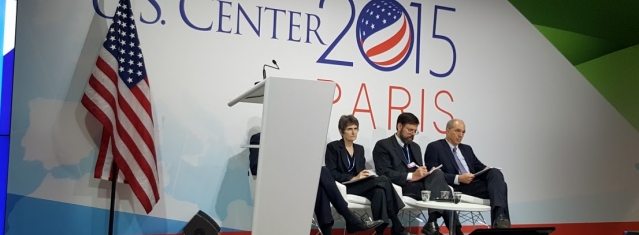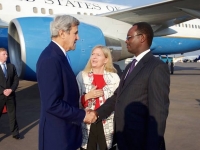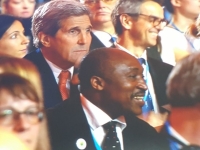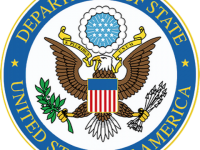Politics
Remarks of John Kerry at the Plenary of the 28th Meeting of the Parties
to the Montreal Protocol in Kigali

US Pavilion COP21 (Source: Rahma Sophia Rachdi)
USPA NEWS -
Today, in Kigali, the parties to the Montreal Protocol are again called on to summon our shared commitment to the only planet that we have.' John Kerry Said at the Plenary of the 28th Meeting of the Parties to the Montreal Protocol yesterday.
SECRETARY KERRY: Well, good afternoon everybody. I want to begin by thanking the president of this Meeting of the Parties, Minister Biruta, and the Government of Rwanda for the terrific job that they have done in hosting everybody all of this week here in beautiful Kigali. I also want to thank the terrific administrator of the U.S. Environmental Protection Agency ““ my friend, Gina McCarthy ““ and Ambassador Jennifer Haverkamp, who have been leading our team. And if you´ll permit me, I want to thank our entire team and all of the teams ““ everybody here has been working extraordinarily hard on this for a long period of time.
And therefore, I want to profoundly thank all of our international partners, without whom there is no multilateral effort, there is no accountability, there is no transparency, there is no effort. The delegations have all been working hard to ensure that we live up to our nations´ pledges that were made last fall in Dubai.-------------------------------------------------------------------------
Now, nearly 30 years ago, the countries that we represent came together in Montreal around an agreement that fundamentally shifted the path that our planet was on. It was one of the earliest efforts. I was privileged to be elected to the United States Senate and go in 1985. We began working on this in 1986, “˜7, “˜8, “˜9 ““ ´87 passed; in 1989 it came into effect. I want you to just think of that ““ 28 times we have come together since that time in order to nurture and advance this incredibly daring and effective protocol. And with success, we have the ability to be able now once again to prove the value of multilateral work, the value of diplomacy, and the value of patience.So thanks to the cooperation and the courage that we summoned at that critical time almost 30 years ago, the hole in the ozone layer ““ which had been growing at an alarming rate, and which was the reason that we came together ““ that hole is now shrinking, and it´s on its way to full repair.------------------------------------
So we proved that we can make a difference. We proved that science has a value. We proved that if we come together in a forum like this, we can actually do things that affect the entire planet.
IN KIGALI THE PARTIES TO THE MONTREAL PROTOCOL ARE AGAIN CALLED ON
Today, in Kigali, the parties to the Montreal Protocol are again called on to summon our shared commitment to the only planet that we have. And I can assure you, that in the 30 years´ time from now, our successors will look back and scrutinize, make judgments about the steps that we take or don´t take, fail to take at this time. The only question is whether or not they will be as proud of what we do now as we are of what our predecessors did three decades ago.
Now, everyone in this room is aware of how serious the stakes are. Everyone here knows about the reams of scientific evidence that is gathering by the day and by the week, all of it compounding to provide one of the most authoritative scientific cases we have ever seen with respect to things that happen on the planet, all of them detailing how catastrophic climate change could be for future generations. We all know that the window of time that we have to prevent the worst impacts from happening is in fact narrow, and it is closing fast. We see fires ““ there was a National Academy of Science report just the other day ““ fires lasting longer, fires of greater impact. We see drought lasting longer, happening more frequently. We see agriculture affected in country after country. We see flooding in places it hasn´t occurred. Five-hundred-year floods have become once every five years, 10 years. We all know that adopting an ambitious amendment to phase down the use and production of hydrofluorocarbons ““ or HFCs ““ is likely the single most important step that we could take at this moment to limit the warming of our planet and protect the planet for future generations to come.
It is not often you get a chance to have a .5-degree centigrade reduction by taking one single step together as countries ““ each doing different things perhaps at different times, but getting the job done.
All of us here know that HFCs, which was supposed to be the solution, turned out not to be the solution. We replaced the ozone depleting substances, but we came to understand the hard way that HFCs may be safe for the ozone layer but they are disastrous for our climate, in many cases thousands of times more damaging than carbon dioxide. So today, the use of HFCs in everyday items like refrigerators and air conditioners is responsible for an entire gigaton of carbon dioxide equivalent pollution every single year. Put another way, in a single year, these substances emit as much CO2 equivalent as nearly 300 coal-fired power plants.
In Paris, the world set the goal of limiting the Earth´s warming to well below 2 degrees Celsius. Everybody here understands, and we have heard again and again, an ambitious HFC amendment is the single biggest thing we can do in one giant swoop, in one moment. Kigali can become the pace setter for Marrakesh and the pace setter for next year. That is how much our work here in Kigali matters. That is the responsibility that we share.
Now, obviously, I recognize that although approving the amendment that we seek is an essential step forward, it´s not an easy solution for some countries to decide to make. I understand that. Not easy for anybody to make fundamentally. Implementing it is a different process for each of our countries, and we need to respect that and we are. Some nations, including the United States, have already begun to phase down the use of HFCs, but others have not. And therefore, some of those countries have real concerns about the potential costs.
I believe that what we have done here in the workup to this amendment recognizes those differences, understands the differences, makes genuine efforts in order to try to deal with them by putting money on the table, by stretching out certain kinds of schedules, by dealing with baselines responsibly, and ultimately by having different freeze years that recognize what is genuinely possible.
But it is important for everybody here to remember that one of the reasons that the Montreal Protocol has worked so well is because it accounts for these differences. Cooperation is written right into the text of the agreement. No country has ever been expected to go it alone, and that is absolutely true under the HFC amendment of the type that we have proposed. No country is expected to go it alone. In fact, the multilateral fund exists with the sole purpose of assisting countries in implementing their obligations. Source US Department of State- To be continued in next article
Us Department Of State John Kerry Kigali Rwanda Montreal Protocol Climate Change Meeting Of The Parties Cop22 Hfc Rahma Sophia Rachdi
Liability for this article lies with the author, who also holds the copyright. Editorial content from USPA may be quoted on other websites as long as the quote comprises no more than 5% of the entire text, is marked as such and the source is named (via hyperlink).








